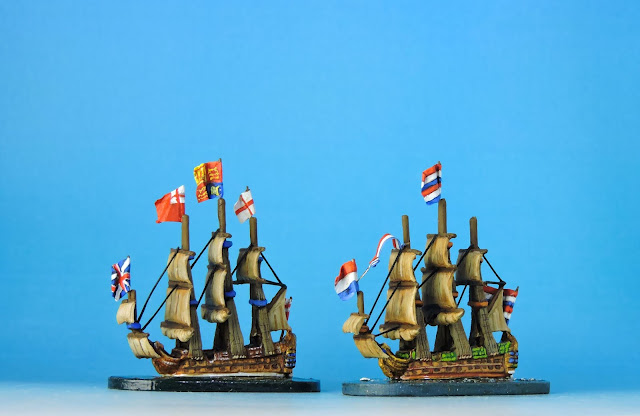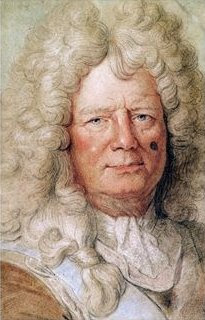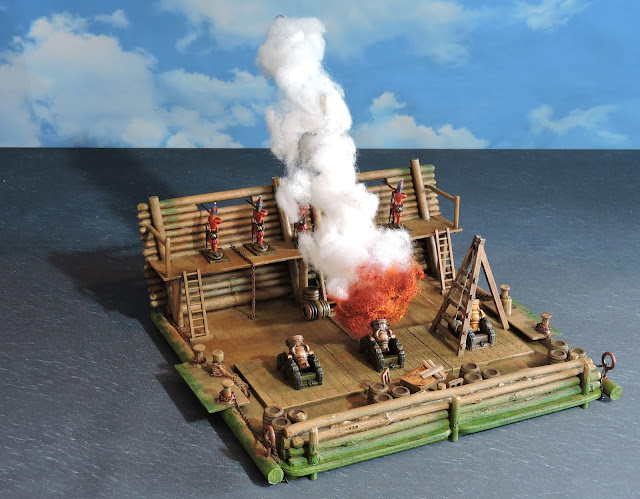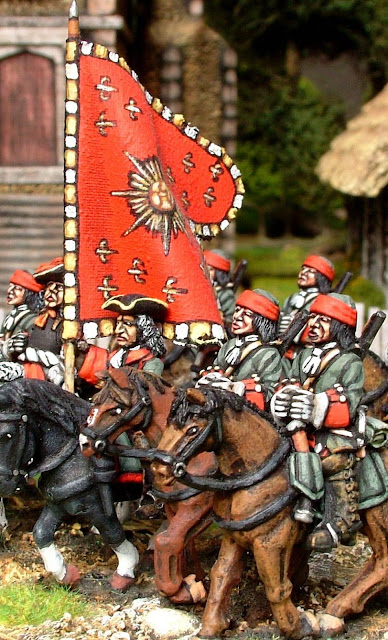The Mission – Destroy
Brest!
The raid was a large scale affair for an action of its type.
It was months in the planning with the objective of wreaking havoc on a key
strategic anchorage for the French fleet at the port of Brest in western
Brittany. Naval bombardments of French ports had been undertaken before, one
such being that prosecuted against St Malo shortly before the Camaret
expedition. The difference with Brest was that the English planned to put
around 8,000 infantry ashore and gain a foothold in order to do some real
damage. Tollemache would lead the army attack which was to be transported by
Admiral Charles, Lord Berkeley. The fleet was substantial, comprising 38
English and 21 Dutch vessels including fire and hospital ships. Troops began
assembling in Plymouth from mid-May 1694.
 |
| Former enemies sailed together to support the English landing. 69 English and Dutch ships were involved. |
Transportation was delayed through
adverse weather and it was only by early June that the armada was off Cape
Finisterre. The French fleet under de Tourville had recently sailed south from
Brest towards the Portuguese coast and bested a combined English and Dutch
fleet off Lagos.
Tollemache’s plan was to land at Camaret Bay, a small inlet
on the opposite shore to Brest and about seven miles south, overcome the
batteries and defences there then march on Brest in order to storm it. To do
this he had between twelve and fifteen battalions who would be ferried ashore
in large open well-boats built specifically for the job and travelling with the
fleet. All of this would be carried out under a bombardment from Berkeley’s
ships. Parallels with the Normandy Landings cannot have passed readers by!
Tollemache was a bold, perhaps rash commander and having
Cutts on the team will not have added a cool voice of reason. John Cutts had
already been wounded near fatally, three times whilst leading breach assaults
in Europe and Ireland. He would go on to be wounded several more times.
Berkeley too appears to have been a somewhat gung-ho leader and thus the reflective
counterweight to English fire-breathing resided with the Dutch. The senior
Dutch officers attached to the enterprise were mostly from the navy and would
not necessarily have been favourably perceived by English army officers who
believed they were not receiving adequate share of the war spoils since the 1688
coup d’état.
What they didn’t
know!
In an age of true political and military duplicity the bold
trio and their Dutch allies had been betrayed well in advance. King James now
resident in exile at St Germaine en laye had friends within the English
establishment. News of the plan to raid Brest had reached the French and King
Louis despatched none other than the great Vauban himself to strengthen the
defences of Brest and assume personal command of the forces in west Brittany.
Vauban was and perhaps still is considered history’s premier military engineer.
His genius remains in evidence all over France and modern Belgium and he is
quite possibly peerless in his achievements.
That the King would have assigned
he of all people to stymie the enemy’s attempts speaks volumes. This battle
turned out to be Vauban’s only field command during his entire career and he
discharged his duties flawlessly.
Vauban strengthened the already formidable castle at Brest,
the forts around Camaret and the larger bay in which Brest nestles. He built
numerous redoubts and emplacements, constructed trench works behind the beaches
and created what could fairly be described as a 17th century
Atlantic Wall with one distinct difference - this one worked. The area had over
300 cannon and 90 mortars with converging lines of fire, hidden batteries
invisible from the open sea and even from the mouth of the bay itself. It is
thought that eight large floating mortar platforms covered the fleet anchorage making
the concentration of firepower formidable.
I am sure many of you are ahead of me
and musing ‘that is a lot of prep and would have taken quite some time and
effort to complete’. Which begs the question; How far in advance did the French
know and who might have tipped them off?
 |
| Even I wouldn't want to believe he dobbed in his own team. |
Smoking pistol?
Much to the discomfort of Churchill fans everywhere, the
most commonly accepted smoking flintlock appears to be in the right hand of
John, Earl of Marlborough. He had maintained a correspondence with King James
his estranged mentor pretty much throughout the turbulent period since
William’s arrival in England. A letter exists revealing the plan for the raid
written by Marlborough and sent to his old friend. Great men such as Winston
Churchill have set out to disprove the betrayal and recently such eminent minds
as the late Richard Holmes and David Chandler have contributed to the debate.
What is interesting is that Holmes and Chandler neither of them reticent about
expressing an opinion are somewhat equivocal on the subject of whether he did
or he didn’t. Why would he? Betraying his own side and being in some way
culpable for the death of upwards of 1,500 English soldiers and sailors seems
unthinkable even for a political operator of Churchill’s calibre. If he did, the
reasons may be very human indeed. The first is self-preservation in that he was
hedging his bets with James and the French. The Allies had recently experienced
bloody defeat at Steenkirke and Neerwinden and the outcome of the whole 1688
adventure may have been in doubt.
Anti-Jacobite purges in the English army
continued well into 1696 so fragility of the Williamite position may have
driven Churchill the survivor to keep all personal options on the table.
He may simply have been jealous of the advancement in
Tollemache’s fortunes perceiving them to be at the expense of his own. Marlborough
was known to be egotistical, greedy and vain. At a time when truly massive
fortunes were being made through military adventurism he may have been smitten
by the green eyed monster.
 |
| The Battle of La Hogue on May 23rd 1692 had destroyed an invasion fleet destined to return King James to England |
Maybe he didn’t do it. Great pains have been taken to prove
that the letter was written too late to have been the source of the betrayal and
that someone else told the French way before Churchill’s missive arrived at the
Jacobite Court in exile. If this is true, why did he write the letter in the
first place? Perhaps as an insurance policy or as an act of conscience. The
matter has been obscured by a variety of counter argument and convoluted
rationale against yet, the possibility remains that Marlborough was the source
of the leak.





